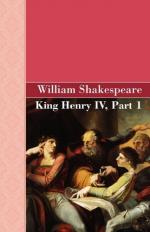|
This section contains 10,155 words (approx. 34 pages at 300 words per page) |

|
SOURCE: “Uneasy Lies: Language and History in Shakespeare's Lancastrian Tetralogy,” in Henry the Fourth Parts I and II: Critical Essays, edited by David Bevington, Garland Publishing, 1986, 359-85.
In the following essay, originally published in 1984, Macdonald traces the development and use of language in Shakespeare's history plays, focusing on Henry IV, Parts I and II, and examines the linguistic conventions that sustain and govern the vision of kingship as portrayed in these plays.
There has always been uncertainty about what we call Shakespeare's “histories.” The genre (if it is a genre) seems inherently unstable under critical scrutiny, always threatening to become something else, to slide over into other generic modes about which there is firmer agreement, to become simply tragedy (Richard II) or comedy (1 Henry IV), or dramatic satire (2 Henry IV). Yet, with the possible exception of early work like The Comedy of Errors, Shakespeare seems never to have...
|
This section contains 10,155 words (approx. 34 pages at 300 words per page) |

|


